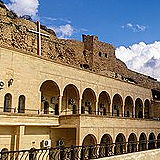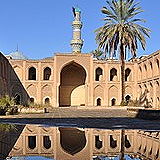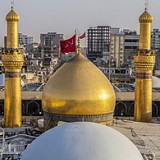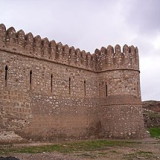
|
Iraq Iraq Last Updated: 08/22/2023 |
| Iraq is a country located in the Middle East, bordered by Iran to the east, Turkey to the north, Syria to the northwest, Jordan to the west, Saudi Arabia to the south, and Kuwait to the southeast. It has a rich history, diverse culture, and significant geopolitical importance in the region. Its population was 43.5 million in 2022. | |
| - Geography: Iraq is characterized by a variety of landscapes, including deserts, fertile plains, and mountainous regions. The Tigris and Euphrates rivers flow through the country, historically providing water for agriculture and sustaining ancient civilizations. - History: Iraq is often referred to as the "Cradle of Civilization" due to its historical significance as the birthplace of some of the world's earliest civilizations, including Sumer, Akkad, Babylon, and Assyria. The region has a complex history of empires, conquests, and cultural exchanges. - Modern Iraq: Iraq became a modern nation-state after World War I when it was placed under British mandate. It gained full independence in 1932. The country has faced periods of political instability, including the rule of Saddam Hussein, who led the nation from 1979 to 2003. - Recent History: The early 2000s saw Iraq become a focus of international attention due to the United States-led invasion in 2003, which aimed to remove Saddam Hussein's regime on the premise of possessing weapons of mass destruction, though such weapons were not found. The aftermath of the invasion led to complex security, political, and humanitarian challenges. - Post-Invasion Challenges: The aftermath of the invasion led to sectarian tensions, insurgency, and the rise of extremist groups, most notably ISIS - Islamic State of Iraq and Syria. The country has faced significant challenges in governance, security, and reconstruction. - Government: Iraq is a federal parliamentary republic. Its government structure includes a president, prime minister, and a parliament consisting of the Council of Representatives. The country has been working to establish stable governance and address ongoing political and sectarian divisions. - Culture and Religion: Iraq is home to diverse ethnic and religious groups, with Arab Shia Muslims forming the majority. The country also has significant populations of Sunni Muslims, Kurds, and various Christian and other minority communities. The cities of Baghdad, Mosul, and Basra have historically been centers of culture, trade, and education. - Oil Reserves: Iraq possesses one of the world's largest proven oil reserves, making oil a crucial component of its economy. The country heavily relies on oil exports for revenue. - Challenges: Iraq faces challenges related to security, political stability, economic development, infrastructure reconstruction, and providing basic services to its citizens. - Cultural Heritage: Iraq boasts a rich cultural heritage, including historical sites, archaeological treasures, and ancient ruins. Unfortunately, many of these sites have been damaged or destroyed due to conflicts and looting. | |
Wikipedia
Iraq » Irq
Place » City

|
Baghdad, Iraq Place » City Baghdad is the capital city of Iraq and one of the oldest continuously inhabited cities in the world. With a long and storied history, Baghdad has played a significant role in the development of culture, trade, and politics in the Middle East. Its population was 8,126,755 in 2018. 135 views 💖 1 👍 0Iraq |

|
Imam Husayn Shrine Place » Temple The Imam Husayn Shrine is a highly revered religious site located in Karbala, Iraq. It is one of the most important sites in the Shia Muslim world and holds deep significance in Islamic history and culture. The shrine is dedicated to Imam Husayn ibn Ali, the grandson of Prophet Muhammad and the third Shia Imam. 653 views 💖 1 👍 0Karbala 56001, Iraq |

|
Kirkuk Citadel Place » Historical Place Kirkuk Citadel is located in the centre of the city of Kirkuk in Iraq, and is considered to be the oldest part of the city. The Kirkuk Citadel stands on an artificial mound 130 feet high located on a plateau across the Khasa River. 457 views 💖 1 👍 0Kirkuk 36001, Iraq |